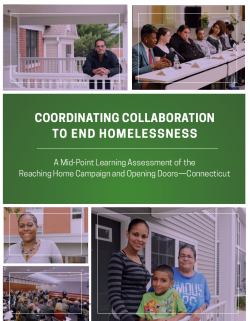Aug
4
2015

Written by Tina Law
According to its most recent study in 2013, the U.S. Interagency Council on Homelessness estimates that more than 600,000 individuals experience homelessness across the country. In Connecticut, advocacy organizations, government agencies, and community providers are coming together in a campaign to end homelessness in their state.
In our latest report, Coordinating Collaboration: A Mid-Point Learning Assessment of the Reaching Home Campaign and Opening Doors-Connecticut, we share the story of how a dedicated group is working together across sectors, geography, and issue areas to address a social problem once thought to be intractable.
Coordinated by the Partnership for Strong Communities (PSC), the Reaching Home Campaign and Opening Doors-Connecticut (the “Campaign”) brings together a broad spectrum of partners in a formation that we now call Collective Impact. Guided by the vision that “No one should experience homelessness,” the Campaign is moving rapidly towards its goal through a combination of advocacy, provider coordination, and public awareness efforts. In just three years, it has advocated for and secured over $300 million in funding for programs to end homelessness; conducted the state’s first study of youth experiencing homelessness; and closed in on the goal of ending homelessness among veterans. A Campaign participant reflected: “The purpose of [the Campaign] is to end homelessness… We hear that message loud and clear, and it’s exciting to set targets and start to see results.”
Backbone organization PSC and its major supporter, the Melville Charitable Trust, were eager to learn how they could bolster their young collaborative effort. Through interviews and surveys, BMP learned about the strengths the contributing to the Campaign’s remarkable success thus far, as well as the opportunities and challenges it faces. In the report, we identified five main takeaways from our learning assessment.
1. Finding a shared purpose not only galvanizes participants around common goals but may also help participants to feel less isolated in their own daily work. In the Campaign, participants readily identified ending homelessness as their shared purpose and 95% of those who were surveyed said that they now feel part of a broader effort to end homelessness as a result of their involvement.
2. Maintaining strong partnerships with government actors and developing a unified voice are key to effective advocacy. Campaign participants attributed much of their success in state-level legislative and administrative advocacy to their ongoing engagement of legislators and state agencies, as well as their work in collectively defining a slate of shared policy priorities.
3. Building a broad base of support requires extending engagement beyond the usual suspects. For the Campaign, housing service providers, housing advocates, and government agencies focused on housing have been natural allies in its work to end homelessness. However, to expand its impact, the Campaign has to continue to involve groups that do not work directly on issues of homelessness (i.e., hospitals, workforce partners), as well as line staff at provider organizations and individuals who have experienced homelessness.
4. Succeeding in collaborative work requires clear internal structures and processes. Over the past several years, Campaign participants have organized their work into two leadership committees and several topical workgroups. The findings indicate that internal structures and process must be well-aligned to continue to effectively advance the goal of ending homelessness.
5. Communicating with participants, external allies, and the broader public will help to embed the Campaign’s wins. While the Campaign has mainly used its communication materials as an internal tool, participants remarked that they will need to increase their contact with individuals and organizations who are not already involved in order to expand their impact moving forward.
Partners in the Campaign are well on their way to ending homelessness in their state. How they have been succeeding and their future needs are shared in the full report.
